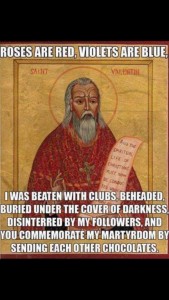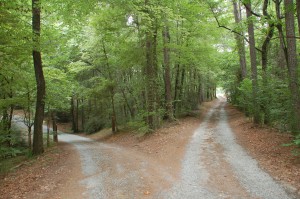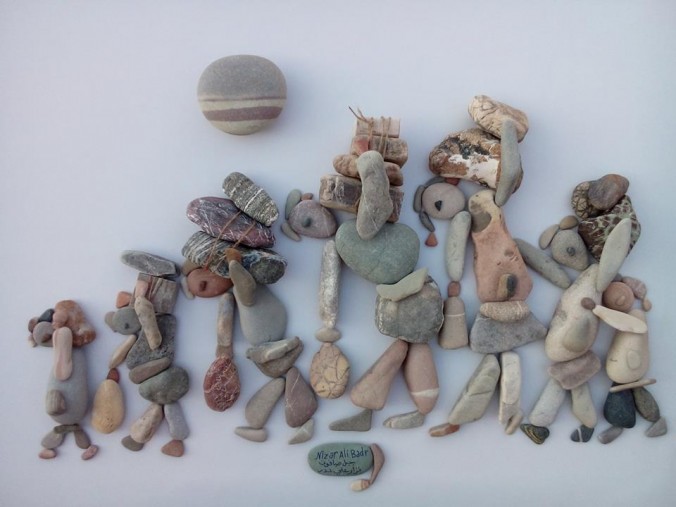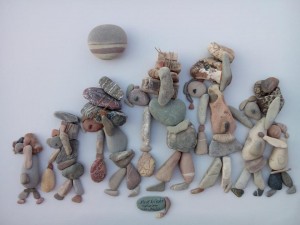Category: 2016
In just the last few weeks there have been horrific terrorist attacks in Maiduguri, Nigeria; Ankara, Turkey; Istanbul, Turkey; and Brussels, Belgium; and, I am sure, several other places which were not deemed worth of media coverage. My heart is broken each time I hear of these attacks. I feel small and inadequate each time I hear the news and then go about my day. What are we to do? How are we to help? Ignoring the pain is not the answer; nor is making it about our fears and inadequacies.
Our Gospel passage on Sunday featured the famous verse in which Jesus tells the Pharisees that if his disciples were to stop shouting out that Jesus was the “King who has come in the name of the Lord” their silence would only mean that “the stones would shout out.”
When the Paris attacks happened the world took notice. We changed our profile pictures to the Eiffel Tower as a peace sign and the French flag. We were Charlie. We shouted out for justice until those 5 minutes were past. But as attack after attack happens we become dulled to the pain and feel helpless in our warm homes a world away.
I don’t know how we can help aside from using our voices. We can unite with those who are hurting. We can cry out to our political leaders and let them know we won’t stand for this violence. We can cry out to God who cries with us:
Eternal God, in whose perfect kingdom no sword is drawn
but the sword of righteousness, no strength known but the
strength of love: So mightily spread abroad your Spirit, that
all peoples may be gathered under the banner of the Prince of
Peace, as children of one Father; to whom be dominion and
glory, now and for ever. Amen.
There was recently a social experiment shared through a video online. For one full day a chalk board hung on a fence in NYC with the question: “What is your biggest regret?” written across the top. Throughout the day passersby were invited to take a piece of colored chalk and write their regret on the board. No one was interviewed; the organizers never even learned the names of those who wrote those intimate thoughts on the board. At the end of the video they highlighted that a majority of the “regrets” started with the word “not” – they were chances not taken, paths left unexplored, etc… The board was littered with what ifs…[1]
one full day a chalk board hung on a fence in NYC with the question: “What is your biggest regret?” written across the top. Throughout the day passersby were invited to take a piece of colored chalk and write their regret on the board. No one was interviewed; the organizers never even learned the names of those who wrote those intimate thoughts on the board. At the end of the video they highlighted that a majority of the “regrets” started with the word “not” – they were chances not taken, paths left unexplored, etc… The board was littered with what ifs…[1]
I found the video interesting and shared it to see what response it might get from others in my circles. A high school classmate engaged the question and asked another in response: What if the question they explored was phrased as a positive rather than a negative? What if they asked folks what they didn’t regret in life? Would they get the path that lay opposite from the “regret?” The path that was taken?
Two roads diverged in a wood, and I—
I took the one less traveled by,
And that has made all the difference.[2]
“Jesus, full of the Holy Spirit, returned from the Jordan and was led by the Spirit into the wilderness where, for forty days, he was tempted by the devil.” (John 4:1-2a)
Did Jesus regret the road not taken?
We learn in our Gospel lesson for this morning that Jesus was led by the Holy Spirit into the wilderness to be tempted by Satan immediately after his baptism in the River Jordan. This marks the beginning of his ministry and I can’t help by think that Jesus might have hoped for a better “first assignment.” What other opportunities were in front of him at the time? What did he have to say “no” to in order to say “yes” to the Spirit’s leadership?
That’s the thing, isn’t it: Life is full of choices. In order to backpack Europe for a year after college one has to forego the internship at the prestigious company that will set you up for the future. In order to stay home caring for the ailing parent one has to pass up the opportunity to finally have an empty nest after 18 or more years of a full house. In order to become what we are called to be we have to make a hundred choices a day – and sometimes we will wonder what would have happened if we went the other way.
Once Jesus enters the wilderness his time of decision-making is far from over:
- Turn these stones into bread or starve.
- Deny God and have kingdoms, realms, and power handed to you.
- Prove your worth by doing as I say or be called a coward.
Even after Jesus “passes” every test, the last line of our passage says the devil only “departed from him until an opportune time.” (Luke 4:13) This implication that these trials were not the end of Jesus’ temptations on earth fly in the face of what is commonly assumed about Jesus – that he was immune to temptation in his ministry after the desert trials. But if we look to the Jesus of our scriptures: sometimes angry or hot headed, expressing frustration, retreating for communion with God – we find that our Lord was truly fully human AND fully God – he faced the temptation of decision-making just as we do.
When we come to the divergent paths in the woods we always must make a choice – it won’t always be a cut and dry, right vs. wrong decision. There are many times that we must choose between two good things. There are times when we must choose between the known and the unknown. There are times when we must chose between action and inaction; silence and busyness; companionship or desert times. Lent is a season when we choose to make choices aimed at bringing us in closer relationship to God – saying no to distraction and yes to spiritual practices. Why is it that we need a season of invitation to do this?
Probably because the temptation is too great and we need an annual reboot to remind us to: turn our hearts away from sin and towards our God. (Acts 3:19)
As we talk about turning our hearts we cannot forget that today is Valentine’s Day. But rather than making each of you a construction paper heart edged with lacy doilies, perhaps instead we should consider the life of the Saint from whom this day is set aside. There is not much reliably known about the Saint aside from the fact that he was martyred on February 14th, likely in the year 269.[3] The popular story goes like this:
 Saint Valentine was a Roman priest at the time when Emperor Claudius was persecuting the church in a variety of ways. Among the persecutions against the people was Claudius’ edict against the marriage of young people. Claudius believed that young soldiers in the Roman army would fight more bravely if they were not worried about wives and children back home. Thus, Claudius condemned the sacrament of marriage for all men of fighting age. Valentine believed that Claudius was overstepping his bounds and continued to marry young Christian couples in secret. Claudius learned of this and flew into a rage. He summoned Valentine who tried to convert the emperor – this further upset the emperor and Claudius ordered Valentine tortured and imprisoned to stand trial for his crimes.[4]
Saint Valentine was a Roman priest at the time when Emperor Claudius was persecuting the church in a variety of ways. Among the persecutions against the people was Claudius’ edict against the marriage of young people. Claudius believed that young soldiers in the Roman army would fight more bravely if they were not worried about wives and children back home. Thus, Claudius condemned the sacrament of marriage for all men of fighting age. Valentine believed that Claudius was overstepping his bounds and continued to marry young Christian couples in secret. Claudius learned of this and flew into a rage. He summoned Valentine who tried to convert the emperor – this further upset the emperor and Claudius ordered Valentine tortured and imprisoned to stand trial for his crimes.[4]
When it came time to stand trial, a man named Asterius was assigned his judge. Asterius’ daughter was blind and legend has it that Valentine prayed for Asterius’ daughter and she was healed of her blindness – causing Asterius to convert to Christianity. Eventually, Valentine’s trial resumed and he was sentenced to a three-part execution of beating, stoning, and finally decapitation.[5]
Just makes you feel all warm and fuzzy inside – doesn’t it?
It is rumored that the last letter Valentine wrote was to the Asterius’ daughter and that he signed it: From Your Valentine – inspiring the tradition of sending love notes to one’s significant other on Valentine’s day.
“What Valentine means to me as a priest,” explains Father Frank O’Gara, “is that there comes a time where you have to lay your life upon the line for what you believe. And with the power of the Holy Spirit we can do that — even to the point of death.”[6]
“Jesus, full of the Holy Spirit, returned from the Jordan and was led by the Spirit into the wilderness where, for forty days, he was tempted by the devil.” (John 4:1-2a)
Usually when we hear that someone is full of the Holy Spirit it is a time of joy, mystery, and wonder. Yet in the example of Jesus and of Saint Valentine we learn that the power of the Holy Spirit can inspire us to walk in the path laid before us, even when that road is challenging or long. The question the experiment leaders in New York City asked was wo rded in just the right way to get the answer they were seeking. If I were to do the same experiment I would ask: “How have your regrets been redeemed?”
rded in just the right way to get the answer they were seeking. If I were to do the same experiment I would ask: “How have your regrets been redeemed?”
When asked in the negative we can all come up with decisions we’ve made that we wish had gone another way – but without each of those choices we would not be who we are today. This Lenten season, we have the opportunity to be intentional about the choices we make and the pathways we follow. What will influence the choices you make?
Two roads diverged in a wood, and I—
I took the one less traveled by,
And that has made all the difference.[7]
[1] https://www.youtube.com/watch?v=R45HcYA8uRA
[2] The Road Not Taken by Robert Frost
[3] http://www.catholic.org/saints/saint.php?saint_id=159
[4] http://www1.cbn.com/st-valentine-real-story
[5] http://www1.cbn.com/st-valentine-real-story
[6] http://www1.cbn.com/st-valentine-real-story
[7] The Road Not Taken by Robert Frost
“Practice curiosity or wonder as you interact with this neighbor… Practice being interruptible.” – The New Parish by Dwight J. Friesen, Paul Sparks, and Tim Soerens
 Alasdair, my pastoral care sidekick and general wonder-pup, came into my life in the fall of 2012. I’d moved back to Boston after three years at seminary and all of my friends had moved away from the city in those years I’d been gone. I got Alasdair for the companionship he’d provide, but had no idea that he’d also introduce me to the neighborhood I’d been living in for the past 6 months.
Alasdair, my pastoral care sidekick and general wonder-pup, came into my life in the fall of 2012. I’d moved back to Boston after three years at seminary and all of my friends had moved away from the city in those years I’d been gone. I got Alasdair for the companionship he’d provide, but had no idea that he’d also introduce me to the neighborhood I’d been living in for the past 6 months.
There is something about a dog that makes you approachable. All of a sudden I was meeting my neighbors. They would stop us during our walks first to pet Alasdair, and then to ask questions about where we lived, what I did, and so on. In 6 months of living in that neighborhood alone, no one had ever talked to me when I was out for a walk. I might get a polite nod if the person weren’t engrossed in their smart phone, but it was rare. We have become a population of people who are too busy to say hello. We are no longer curious about the stories we could learn simply by looking each other in the eye.
I am reading a book called The New Parish, about the idea of getting back to the organization of neighborhood parishes. The authors looked at the fact that since transportation became a “given,” people are able to engage in faith communities as consumers. If the “product” the local faith community is “selling” doesn’t meet one’s expectations they can go elsewhere. Christianity has moved from a community religion to one of personal relationship. When we start thinking of our faith exclusively as an individual venture we no longer have need of companions on the journey and we become insulated from the very human experience that God entered into in the form of Jesus.
It is in relationship that we learn about ourselves and the world around us. We become less selfish and more aware when we take a moment to step outside of ourselves long enough to see the world through the experience of another. We learn cooperation and collaboration when we are forced to live in long-term relationship with others: in good times and bad. Staying in relationship, even when it is hard, helps us to grow into the likeness of Christ. We cannot be in relationship if we allow our busyness to rule the day, preventing us from engaging with others on the journey of life with us. In this day and age when we are being pulled in every direction and told all the things we need to accomplish to be viewed as valuable we don’t have time to say hello to our neighbors – but those are the relationships which empower change. How could our lives, and the lives of those around us, improve if we “practice[d] being interruptible?”
 I have recently restarted running after some time off for a nagging injury and persuasive laziness. When I started running three years ago it was something of which I didn’t think I was capable. I got up every morning at 5:30 to pound out a few miles. I had a very specific playlist of motivational songs with the perfect beat to encourage my pace at a healthy rate that was neither too fast nor too slow. I could not run without those headphones, it would be impossible. I passed numerous strangers on the bike path each day, never saying hello to a single one. As I restart my practice I’ve learned to run without music which not only allows me to hear the sounds of the city and the voice of God, it meant I could hear when Ed, my 94 year old neighbor, shouted “Way to go!” as I trotted by this morning. I stopped to give him a smile and return the greeting before setting off again, and my day is better for it.
I have recently restarted running after some time off for a nagging injury and persuasive laziness. When I started running three years ago it was something of which I didn’t think I was capable. I got up every morning at 5:30 to pound out a few miles. I had a very specific playlist of motivational songs with the perfect beat to encourage my pace at a healthy rate that was neither too fast nor too slow. I could not run without those headphones, it would be impossible. I passed numerous strangers on the bike path each day, never saying hello to a single one. As I restart my practice I’ve learned to run without music which not only allows me to hear the sounds of the city and the voice of God, it meant I could hear when Ed, my 94 year old neighbor, shouted “Way to go!” as I trotted by this morning. I stopped to give him a smile and return the greeting before setting off again, and my day is better for it.
 I want to begin by thanking each and every one of you. This has been a challenging year for Saint Dunstan’s. Beloved staff members have departed, some parish members have taken a break from participation, and the path towards calling a new rector has felt long and challenging. All of this may be true, but through all of this change and uncertainty something beautiful and important has remained the same – you, all of you in this room, and others in our community who could not be with us today, have remained committed to the mission and ministries of Saint Dunstan’s Episcopal Church: The Spirit of Saint Dunstan’s is Strong.
I want to begin by thanking each and every one of you. This has been a challenging year for Saint Dunstan’s. Beloved staff members have departed, some parish members have taken a break from participation, and the path towards calling a new rector has felt long and challenging. All of this may be true, but through all of this change and uncertainty something beautiful and important has remained the same – you, all of you in this room, and others in our community who could not be with us today, have remained committed to the mission and ministries of Saint Dunstan’s Episcopal Church: The Spirit of Saint Dunstan’s is Strong.
When I arrived at Saint Dunstan’s on Monday, June 1st, I arrived bright and early to prepare to officiate at the funeral of founding member, Bill Dolan. Over the previous week, while still technically working full time in Winchester, I had met with Bill’s family and a few members of Saint Dunstan’s who all wanted to make sure I fully understood what an important and lovely man Bill was. I arrived at the church, a bundle of nerves. I entered the nave, where the choir was practicing, and looked around to familiarize myself. I noticed the paschal candle in the front, near the pulpit, and decided – since clearly the new girl on the first day knows best – that the paschal candle should be closer to the center. I went to lift the candle only to discover that a wrought iron candleholder that is as tall as I am is heavy! I didn’t let this deter me; I took a deep breath, bent my knees, and proceed to not only lift the whole thing, but also to spill the reservoir of water in the top all over the floor and myself. (That, my friends, is one way to introduce yourself to the choir!)
I had to laugh at myself as I realized that I had just been baptized into this ministry at Saint Dunstan’s by the paschal candle itself!
 The paschal candle, which is the candle lit from the new fire at the Easter Vigil and which represents the light of the Resurrected Christ is used in our liturgy during Eastertide and when we celebrate certain rites in the church, such as Baptism and Burial of the Dead. One of my favorite liturgical elements of the service of Holy Baptism is when we light an individual taper from the paschal candle and give it to the family of the baptizand inviting them to, “Receive the light of Christ…”
The paschal candle, which is the candle lit from the new fire at the Easter Vigil and which represents the light of the Resurrected Christ is used in our liturgy during Eastertide and when we celebrate certain rites in the church, such as Baptism and Burial of the Dead. One of my favorite liturgical elements of the service of Holy Baptism is when we light an individual taper from the paschal candle and give it to the family of the baptizand inviting them to, “Receive the light of Christ…”
There are so many ways that I see the light of Christ shining brightly in this place:
- In the immaculate flower arrangements put together by Dorothy Bartlett, Sue Fitzgerald, and the members of the flower guild.
- In the prayerful conversations between Jim Nail, Marie Nagode, Mike Jones, and Todd Young as they prayerfully and skillfully auditioned and interviewed musicians in an effort to continue, and perhaps even elevate, the tradition of excellent music at Saint Dunstan’s.
- In the loving support Lynn Petrasch, Joanne Crispin, and the pastoral care team faithfully offer to support the sick, homebound, and grieving members of our community.
- In the skillful facilitation of Catherine Belden has facilitated our efforts to provide supplies ensuring equal access for local families to a homemade Thanksgiving feast.
- In the creative and collaborative new outreach effort designed by Kate Haviland and Amelia Slawsby that connected a fun local holiday tradition to those in need.
- In the fantastic celebration at the Giannini home this past fall where friends gathered for food, fellowship, and fun.
- In the driveway-turned-water park where B-SAFE participants squealed and delighted on a carefree Friday in Dover.
- In the weekly dreaming and scheming done by Bill Wickham, Amelia Slawsby, Carol Chirico, Todd Young, Grant Stephen, Catherine Belden, and Joanne Crispin as they have led us in our search for a new rector.
- In a confirmation class prayer activity designed by Fiona Vidal-White that opened teens minds and hearts, in a brand new way, to the wonder of the Triune God.
- In the TIRELESS advocacy of Deb Reinemann and Linda Eason who have been the very definition of faith, hope, and love as they have championed for needs and concerns of every member of this congregation, in big ways and small, on a parish, community, and diocesan level.
You are a tenacious church. You are a church that gets stuff done. You are a church with a heart for mission. You are a church with a longing for God. You are a church standing on the precipice of a crucial time in your history, and together we are going to continue walking forward in the path God has laid before us.
I have spent a lot of time over the last several months preaching about our call to be fed together at the table of the Lord and then to use that food as fuel – sending us out into service to the world. This Lent you will hear a slight alteration to that message – you are a community that needs rest and revival; rest that will enable you to “go forth into the world rejoicing in the power of the Spirit.” You work so tirelessly to care for others, both inside and outside of this community, that it can be difficult to find the strength to accept care for yourselves. I have heard from more of you than I can count that you are tired; that you need a break.
The balance of church is that it is a cooperative structure requiring leadership and organization from within. Church is not a building, a staff, or even programs – church is a community of people coming together to share the Love of God with the world. The balance is in finding ways that participation and leadership can renew our energy rather than depleting it. The irony is, as we hear in the prayer attributed to Saint Francis, that it is “in giving that we receive, in pardoning that we are pardoned, and in dying that we are born to eternal life.” That’s why we see the Paschal candle at both baptisms and funerals.
We learn in our Gospels that Jesus “would withdraw to deserted places and pray.” (Luke 5:16) There is no shame in refueling you soul – God the creator took the seventh day to rest – and commanded us to do the same!
 Elizabeth Kubler-Ross wrote: “People are like stained-glass windows. They sparkle and shine when the sun is out, but when the darkness sets in, their true beauty is revealed only if there is a light from within.” Like the paschal flame we receive at baptism, we must tend the light of Christ that is inside of our hearts in order to allow our colors to shine brightly for all to see. You, the people of God called to be Saint Dunstan’s Episcopal Church, are a kaleidoscope. It is our work together over these next several weeks to see what it is that we need to put down in order to free ourselves to dance into the next era in the life of the church.
Elizabeth Kubler-Ross wrote: “People are like stained-glass windows. They sparkle and shine when the sun is out, but when the darkness sets in, their true beauty is revealed only if there is a light from within.” Like the paschal flame we receive at baptism, we must tend the light of Christ that is inside of our hearts in order to allow our colors to shine brightly for all to see. You, the people of God called to be Saint Dunstan’s Episcopal Church, are a kaleidoscope. It is our work together over these next several weeks to see what it is that we need to put down in order to free ourselves to dance into the next era in the life of the church.
- Most of the Rector Search Committee is unable to be with us this morning because they are out visiting candidates to become the next Rector of Saint Dunstan’s.
- The 50th Anniversary of Saint Dunstan’s is right around the corner and the Vestry has voted to appoint Chuck DeBevoise to chair the committee that will design a number of events to help us to celebrate the history and future of this remarkable community.
- And, as our new presiding bishop Michael Curry has told us, we are members of the Jesus Movement. If we are going to go boldly into the world sharing the love of Christ that we know in our lives, we need to make space for the Holy Spirit to buoy our hearts with Her love.
And so, as I have done once before, I am going to give each of you a stone to take home today. These stones are from my favorite place to “be still and know that God is God” – middle beach in Kennebunk, Maine. This stone is to represent the weight that each of us carry. This stone is a physical reminder of the burdens we bear and that God is inviting us to give up to Christ. Over the next few weeks I invite each of you to prayerfully consider what God is inviting you to personally give up: either at church, at home, at work, or anywhere in your life where there is a weight that is inhibiting your ability to dance with the Spirit. Once you’ve identified and feel prepared to truly offer that burden up to God, I hope you will bring your rock back, infused with your prayers, and place it into the bowl that will be in front of the altar throughout the season of Lent. You can bring it back any time that you want, on a Sunday or in the middle of the week. During a service or when the sanctuary is empty. We will commit these stones to the garden during Holy Week as a symbol of our fresh start and new life in Christ.
favorite place to “be still and know that God is God” – middle beach in Kennebunk, Maine. This stone is to represent the weight that each of us carry. This stone is a physical reminder of the burdens we bear and that God is inviting us to give up to Christ. Over the next few weeks I invite each of you to prayerfully consider what God is inviting you to personally give up: either at church, at home, at work, or anywhere in your life where there is a weight that is inhibiting your ability to dance with the Spirit. Once you’ve identified and feel prepared to truly offer that burden up to God, I hope you will bring your rock back, infused with your prayers, and place it into the bowl that will be in front of the altar throughout the season of Lent. You can bring it back any time that you want, on a Sunday or in the middle of the week. During a service or when the sanctuary is empty. We will commit these stones to the garden during Holy Week as a symbol of our fresh start and new life in Christ.
I joked two weeks ago, after watching the State of the Union address that I wanted to say in my sermon, “The state of Saint Dunstan’s is Strong.” You generously laughed at my lame attempt at political humor, but I hope you realize that the funniest part of every joke is the truth that lies therein. The State of Saint Dunstan’s IS strong: It is strong because, to paraphrase our Epistle lesson from this morning, “faith, hope, and LOVE abide; and the greatest of these is Love.”
I love you, Saint Dunstan’s. I am grateful for your faithfulness. And I cannot adequately express the great hope I perceive for this next period in the life of this small, but mighty church of God.



Recent Comments